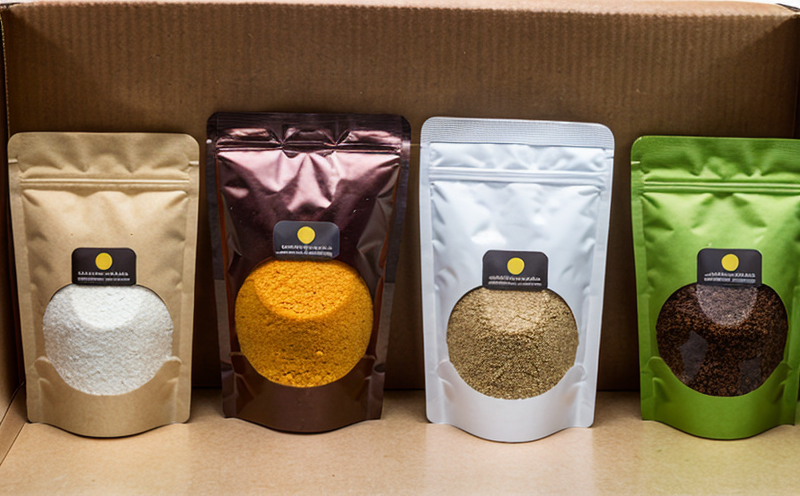Microplastic Release Testing in Food Packaging
In recent years, microplastics have emerged as a significant concern in food packaging materials. The ingestion of microplastics has been linked to various health risks, leading to increased scrutiny from regulatory authorities and consumer advocacy groups worldwide. This service focuses on the rigorous testing of food contact materials (FCMs) and packaging used in the food industry to ensure they do not release harmful levels of microplastics into food products.
Microplastic release testing is essential for maintaining compliance with international standards such as ISO 14352-1, which sets guidelines for the biodegradation of plastics under composting conditions. This service employs advanced analytical techniques to detect and quantify microplastics in packaging materials that come into contact with food. The aim is to provide manufacturers with reliable data that can be used to optimize their products, ensuring they meet stringent safety requirements.
The testing process involves several key steps: material selection, sample preparation, analysis using sophisticated instrumentation like Fourier Transform Infrared Spectroscopy (FTIR) and scanning electron microscopy (SEM), and interpretation of results according to relevant standards. This approach ensures accuracy and consistency in identifying even trace amounts of microplastics within packaging.
For instance, consider a scenario where a manufacturer wants to introduce a new type of plastic film into their product line. Before launching it onto the market, they would need to undergo comprehensive microplastic release testing to verify its safety. Our lab uses state-of-the-art equipment and methodologies to perform this assessment, providing detailed reports that outline any potential risks associated with using such material in food packaging.
The importance of microplastic release testing extends beyond just compliance; it also plays a crucial role in protecting brand reputation by ensuring product safety. By identifying and addressing issues early on in the development stage, companies can avoid costly recalls and negative publicity that could damage their image among consumers. Additionally, this service helps businesses stay ahead of emerging regulatory trends, allowing them to innovate safely within legal boundaries.
To illustrate how this testing impacts real-world applications, let us look at an example from the beverage industry. Suppose a company produces reusable water bottles made from PET plastic; our lab could analyze these containers for any traces of microplastics that might leach into the drink during storage or use. If no harmful levels are detected, then consumers can continue enjoying their preferred beverages without worry about health concerns.
| Step | Description |
|---|---|
| 1. Material Selection | Choose appropriate samples based on intended food contact. |
| 2. Sample Preparation | Cut or grind the sample into small pieces for analysis. |
| 3. Extraction | Use solvents to extract potential microplastics from the sample. |
| 4. Analysis | Analyze extracted samples using FTIR and SEM techniques. |
Industry Applications
This testing service finds extensive application across various sectors including food manufacturing, beverage production, and pharmaceutical packaging. It is particularly vital for companies dealing with single-use plastics or those seeking to replace conventional packaging materials with more sustainable alternatives.
| Risk Factor | Consequence |
|---|---|
| Leaching of chemicals | Possible contamination of food or beverages. |
| Inhalation during processing | Health risks to workers involved in packaging. |
| Consumption by end-users | Potential health implications for consumers. |
Eurolab Advantages
At Eurolab, we pride ourselves on offering unparalleled expertise in microplastic release testing. Our team consists of highly skilled scientists and engineers who stay abreast of the latest developments in this rapidly evolving field.
- Comprehensive Knowledgebase: We possess extensive experience conducting various types of tests, including those required by international standards like ISO 14352-1.
- State-of-the-Art Equipment: Our laboratory is equipped with cutting-edge instruments capable of detecting extremely low concentrations of microplastics.
- Expert Advisory Services: We offer tailored advice to help our clients navigate the complexities of regulatory compliance and sustainability challenges.
Quality and Reliability Assurance
We maintain high standards of quality assurance throughout every stage of the testing process. From initial consultation with client representatives to final report delivery, each step is meticulously documented to ensure transparency and accuracy.
To further enhance reliability, we follow strict protocols for handling samples, ensuring they remain uncontaminated until analysis begins. Additionally, our analysts participate in regular training sessions conducted by industry leaders to keep up-to-date with best practices and emerging technologies.





